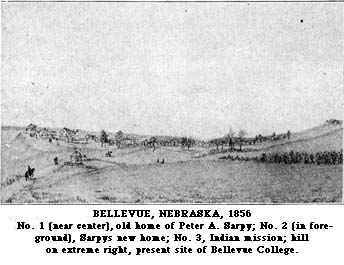
NEGenWeb Project
Resource Center
Church
Congregationalists in Nebraska were keenly alive to the stirring events of the times. At the May meeting, 1860, we find a resolution urging the A. H. M. S. to send "ministers and the Gospel" to the people in the gold fields of the West.
Home evangelization received considerable attention in 1862. At the annual meeting of the association held in Nebraska City, October, 1864, we find this report from the Committee on "The State of the Country":
"Resolved, 1st, That the only way to secure for this government true and permanent peace and prosperity is to prosecute this war to the complete suppression of the Rebellion.
"2d, That the earnest efforts of the government to this end meet our decided approbation.
"3d, That we thankfully recognize the gracious providence of God in the recent victories that have so thrilled every loyal heart."
A year later, September, 1865, the committee, consisting of Rev. Reuben Gaylord, Rev. Isaac E. Heaton, and Deacon J. J. Hawthorn, reported as follows:
"Resolved, 1st, That we gratefully acknowledge the kind providence of God in the final victory obtained over the armed forces of the Rebellion.
"2d, That we shall full secure the legitimate results of this great struggle only by administering equal justice and giving the rights of citizenship to those who have been
|
EARLY DECLARATIONS
|
31
|
lifted out of bondage, and inflicting suitable punishment upon the leaders of the late Confederacy."
Again in 1866, at the annual meeting held in Fontanelle, the Committee on the State of the Country, consisting of Rev. F. Alley, Rev. E. B. Hurlbut, and Bro. G. Gaylord, made the following stirring report:
"Whereas, Our country is now in a very disturbed state, lawlessness and bloodshed deplorably increasing, and
"Whereas, The unreasonable prejudice against and oppression of the colored race are hindrances to our peace and the progress of civilization among us, therefore
"Resolved, That we deeply regret the present unhappy disagreement between the legislative and executive departments of our government.
"Resolved, That in impartial suffrage and impartial justice to all classes we recognize the only permanent basis of the peace and prosperity of this nation.
"Resolved, That we regard the course of the President of these United States in his general policy, and especially in his late speeches, as opposed to the peace and prosperity of this nation, and derogatory to the dignity of the high position in which he has been placed."1
In expressing itself on local conditions in 1865 the association put itself on record as follows:
"New fields are opening and demanding culture, and laborers are needed to go in and possess the land. A large increase of material prosperity has characterized this year, and we enter upon the year before us with new encouragements and hope. While we rejoice that so much has been done, we feel humbled that no more has been accomplished, and desire humbly to beseech a larger measure of divine influence and a higher spirituality."
| 32 |
CONGREGATIONAL NEBRASKA
|
A declaration on temperance in the same year is of interest:
"In view of the alarming prevalence of intemperance in our land, and especially among the newly settled portions of our country,

"Resolved, That the Association of Nebraska hereby declare,
"I. That the chief instrumentality upon which temperance men must rely in their struggle to put down the great evil is the education of the people to the appreciation of the evils and dangers of intemperance.
"II. That solemn obligation is laid upon the church to take a foremost part in the work, and that all Christian men and ministers must let their influence be felt decidedly against this evil.
|
EARLY DECLARATIONS
|
33
|
"III. That the only platform on which this struggle can be carried to a decided issue in our country is total abstinence from all intoxicating drinks.
"IV. That we decidedly disapprove of the use of beer, ale, and all malt liquors or domestic wines, whether manufactured from grapes, currants, or any other fruit, except for medicinal purposes."2
In 1868 the association says that:
"The use of intoxicating liquors as a beverage, and the present popular uses of tobacco, are spots upon the Christian character, examples pernicious to society and the Church of Christ; that they greatly impair personal usefulness, and are to be discountenanced and avoided by every professed follower of Jesus. That extravagance and intemperate habits in any sphere whatever are opposed to the spirit of the Gospel, consequently wrong, and the money thus expended ought to be consecrated to the service of Christ's cause."3
It will thus be seen that our Church fathers were prompt in taking advanced positions on all great moral questions in Church and state, not forgetting that they were citizens as well as Christians.